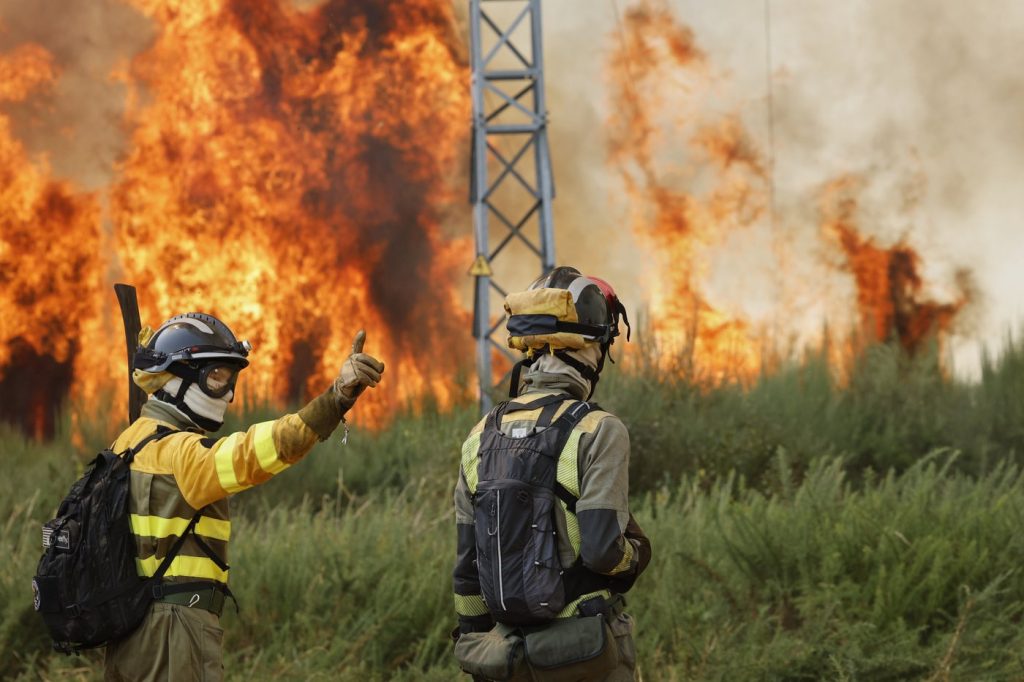LISBON, Portugal (AP) - Spain is deploying an additional 500 soldiers to combat wildfires that have ravaged parched woodlands amid an extended period of extreme heat, according to Prime Minister Pedro Sánchez. This decision follows the deployment of over 1,400 troops already engaged in wildfire efforts as authorities struggle to manage forest fires, particularly in the northwestern region of Galicia. The region is experiencing multiple blazes, notably near the city of Ourense, with 12 major wildfires confirmed by the head of the Galician regional government, Alfonso Rueda, during a press conference with Sánchez.
Rueda emphasized that homes remain at risk, leading to lockdowns and mandatory evacuations for affected residents. Galicia has faced persistent flames for over a week, and unprecedented temperatures in Spain are expected to reach 45 degrees Celsius (113 degrees Fahrenheit) on Sunday, according to the Spanish national weather agency, AEMET. The previous day, Cordoba registered a maximum temperature of 44.7 degrees Celsius (112.46 degrees Fahrenheit).
AEMET warned that the fire danger is extreme throughout most of Spain, correlating with the alarming frequency of wildfires this year that have devastated 158,000 hectares (390,000 acres) of land—an area roughly equivalent to metropolitan London. The European Union has noted that Europe is warming at twice the global average since the 1980s, further aggravating the incidence and intensity of heat and dryness, making regions more susceptible to wildfires.
Spain is not only reinforcing its ground forces but is also anticipating the arrival of two Dutch water-dumping aircraft to join those from France and Italy already assisting the Spanish authorities under a European cooperation agreement. Firefighters from various other nations are expected to arrive in the region in the coming days, as confirmed by Virginia Barcones, chief of Spain’s Civil Protection Agency. Furthermore, the national rail operator Renfe announced the suspension of high-speed train services between Madrid and Galicia due to the ongoing fires, while Galician authorities advised residents to wear face masks and minimize outdoor exposure to avoid inhaling smoke and ash.
In contrast, Portugal is bracing for cooler weather following a series of severe woodland fires and has enacted a national state of alert for wildfires. This state of alert, which began on August 2, was scheduled to end the day before the arrival of two Swedish firefighting planes. As with Spain, Portugal’s resources are significantly strained, deploying over 4,000 firefighters, 1,300 vehicles, and 17 aircraft as per the country’s Civil Protection Agency. The scorched area in Portugal this year amounts to approximately 139,000 hectares, which is 17 times higher than in 2024, according to preliminary figures from the Institute for the Conservation of Nature and Forests.
Other European nations, including Greece, Bulgaria, Montenegro, and Albania, have also sought assistance from the EU’s firefighting force in response to escalating forest fires. Notably, the firefighting force has been activated as frequently this year as it was during the entire last summer fire season.
Turkey is also grappling with severe wildfires, having reported 19 fatalities due to recent blazes. On Sunday, parts of the historic Gallipoli region, known for its WWI memorials, faced evacuations as wildfires threatened local homes in the northwest of the country. As a precautionary measure, six villages were evacuated, as confirmed by Omer Toraman, the governor of Canakkale province. Approximately 1,300 firefighting personnel, supported by 30 aircraft, are currently combating the flames, according to the General Directorate of Forestry. Wildfires have proliferated throughout Turkey since late June, exacerbated by record heat, dry conditions, and strong winds.











